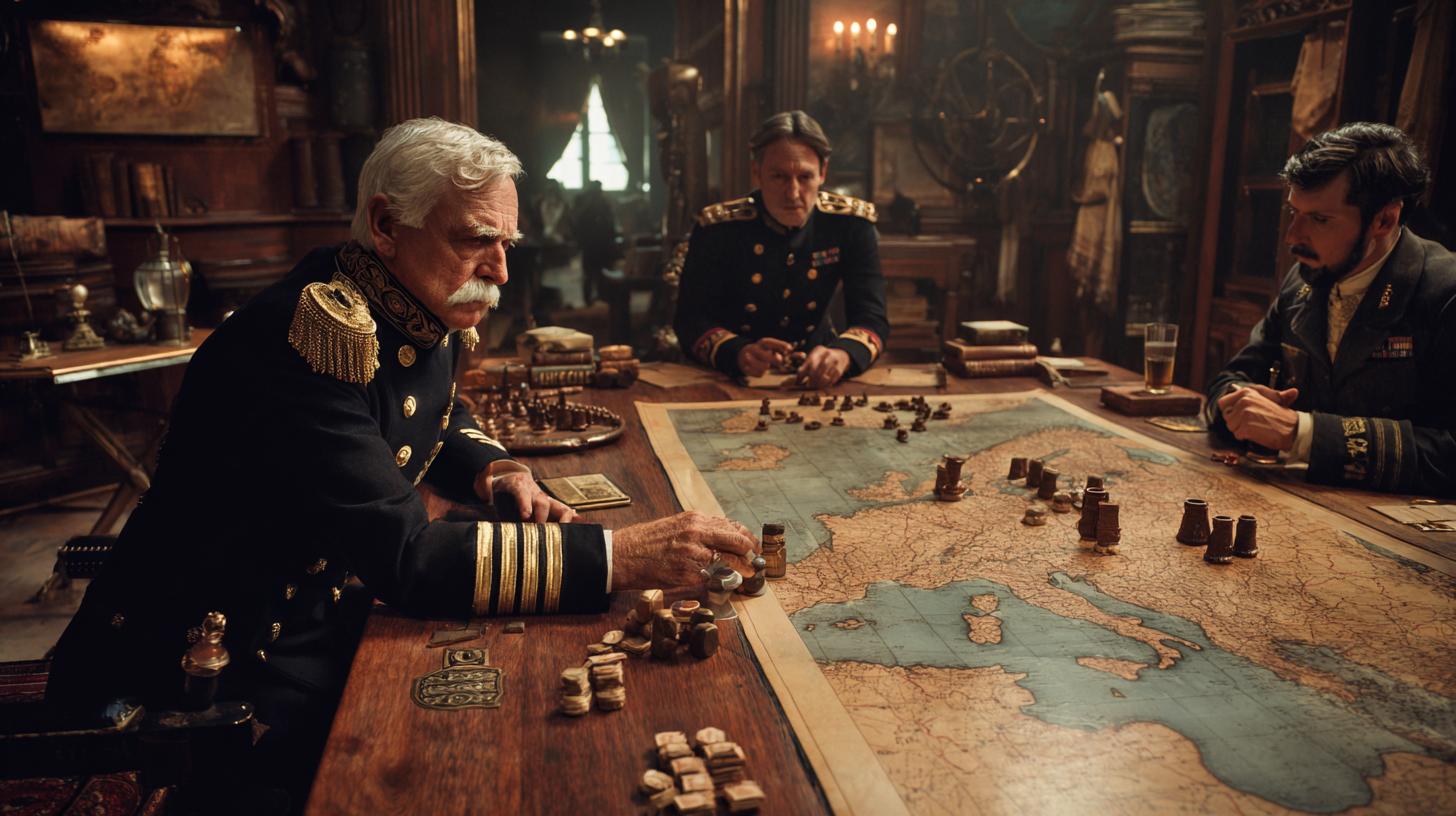Master the Art: How to Play as England in Diplomacy
Ever wondered how to seize strategic advantage and outmaneuver your rivals in one of the most iconic board games ever created? Learning how to play as England in Diplomacy combines careful planning, strong negotiation skills, and a keen understanding of naval power. With its home centers scattered across the British Isles, England holds a unique position—both powerful at sea and vulnerable on the mainland. This guide will walk you through every phase of the game, share actionable tips, and equip you with the confidence to turn your fleet into an unstoppable force. Get ready for an in-depth exploration that will elevate your Diplomacy gameplay and make you a force to be reckoned with.
Understanding England’s Position in Diplomacy
Historical Context and Strategy
In the context of the Diplomacy board game, England’s historical naval supremacy is reflected by its strong starting fleets in the North Sea and the English Channel. Mastering this advantage requires both diplomatic finesse and military precision. Players must leverage England’s maritime dominance to secure supply centers and prevent rivals from encroaching on the home islands. A successful England player balances caution with aggression—knowing when to push forward and when to negotiate. Historical knowledge of British strategy during the 19th and early 20th centuries can inspire modern tactics that keep opponents guessing.
Geographic Advantages and Challenges
England begins with two fleets and one army, giving it an immediate edge at sea but limited ground forces. The English Channel and the North Sea are chokepoints that can be both a blessing and a curse: control them, and you dominate the board; lose them, and you risk isolation. Additionally, the proximity to Denmark, France, and Germany demands constant diplomatic attention. Understanding these geographic dynamics will help you anticipate threats and identify opportunities for expansion. Your ability to adapt to shifting alliances and opportunities will define your success as England.
Key Benefits of Playing as England
- Naval Dominance: Control of major sea zones gives you flexibility to support allies or launch surprise attacks.
- Alliances with France and Germany: Naturally complementary positions create smooth partnership opportunities early on.
- Defensive Position: The British Isles are naturally fortified, reducing early-game vulnerability.
- Flexibility: A strong fleet presence allows rapid redeployment across the board.
- Psychological Edge: Opponents often perceive England as a late-game threat, giving you room to maneuver.
Step-by-Step Guide: Opening Moves and Alliances
Season 1901: Fleet and Army Placements
Your opening orders set the stage for the entire game. A classic English opening is Fleet Liverpool to Irish Sea and Fleet London to English Channel, Army Edinburgh to North Sea, then Army Liverpool holds. This aggressive sea posture puts immediate pressure on France and holds back potential German expansion. Alternatively, a more conservative approach places Fleet London to Wales and Army Edinburgh to Yorkshire, reinforcing homeland security. Choose your opening based on the personalities at the table—if you anticipate aggressive neighbors, lean toward defense.
Forming Early Alliances
Securing an early alliance with France can neutralize a major threat to your Channel. Propose mutual support in Gibraltar to French Marseilles or joint naval operations in the Bay of Biscay. With Germany, negotiate a demilitarized Belgium or North Sea pact to prevent backstab attempts. Early alliances are less about trust and more about managing potential conflicts—maintain open communication and share your long-term vision. Remember, a strong but flexible alliance is far more valuable than a firm but brittle pact.
Mid-Game Strategies for England
Maintaining Naval Supremacy
By mid-game, you should control multiple sea zones and have at least three fleets. Focus on consolidating your maritime routes—consider moves like North Sea to Norwegian Sea or English Channel to Mid-Atlantic Ocean to secure additional supply centers. Keep a close eye on Italy’s naval ambitions in the Western Mediterranean and Russia’s Baltic fleet. A few well-timed fleet swaps can turn a stalemate into a swift victory. Always plan two turns ahead and maintain spare units for surprise maneuvers.
Balancing Allies and Rivals
England’s power often makes it a target for coalitions. To avoid becoming everyone’s foe, dole out small concessions that cost you little but appease major players. For instance, offer to back Germany’s move into Belgium in exchange for support against Russia or Italy. Use proven negotiation techniques like reciprocal favors and timed betrayals to keep allies invested. The key is to be predictable enough to be trusted but flexible enough to act decisively when the moment is right.
Endgame Tips and Tactics
Securing Supply Centers
At the endgame stage, supply centers determine the winner. Prioritize coastal centers like Norway, Portugal, and Spain by leveraging your fleets. If land expansion is necessary, collaborate with your best land-power ally—often Germany—and time your support builds carefully. Avoid overextending your armies into hostile territory without naval backup. A handful of well-placed fleets can paralyze any opponent’s supply routes and force them into submission.
Winning Through Diplomacy vs. Military Power
Your final victory can come through sheer force or a well-crafted diplomatic trap. If you hold an overwhelming fleet advantage, coordinate with allies to encircle and isolate the last rival. If forces are balanced, exploit rifts between your opponents—offer one last-time alliance in exchange for critical support. Victory often belongs to the player who strikes the right balance between hard power and soft power. Keep your communications open and your threats credible.
Common Pitfalls and How to Avoid Them
- Aggressiveness Without Allies: Going solo too early invites a coordinated counterattack. Solution: Secure at least two stable alliances before major offensives.
- Neglecting Home Defense: Overcommitting to foreign conquests can leave the British Isles vulnerable. Solution: Always keep one unit in reserve.
- Breaking Alliances Recklessly: Betrayals harm your reputation and make future negotiations difficult. Solution: Plan betrayals only when the payoff is overwhelming.
- Poor Communication: Silence breeds suspicion. Solution: Provide regular updates and clarify your intentions.
- Ignoring Land Routes: Focusing solely on naval power can be limiting. Solution: Coordinate with land-focused allies for a balanced approach.
Case Study: England’s Victory in a Classic Diplomacy Board Game
In a recent seven-player match, England secured a win by mid-game through an unlikely alliance with Russia. By supporting Russia’s Baltic ambitions in exchange for backing in the Mid-Atlantic Ocean, England controlled five sea zones by turn five. A surprise pivot to support Germany’s move into Belgium shattered the Franco-German coalition. This tactical flexibility and willingness to negotiate at every turn illustrate the dynamic potential of playing as England. Studying this game underlines the importance of timing and alliance management.
SEO Optimization: Meta Description and Internal Linking
Meta Description Suggestion: “Discover proven strategies on how to play as England in Diplomacy—unlock naval supremacy, form strong alliances, and outsmart your rivals with our expert guide.”
Internal Linking Strategy: Link to related posts such as Diplomacy Opening Strategies, Advanced Negotiation Tips, and Winning Endgame Tactics to keep readers engaged and improve on-site SEO.
Ready to Command the Seas?
Now that you know exactly how to play as England in Diplomacy, it’s time to put these tips into practice. Gather your friends, set up the board, and let your fleets sail toward victory. Don’t forget to share your own success stories and tactics in the comments below—your insights could help the next would-be Admiral of the North Sea. May your reign on the high seas be swift and triumphant!


